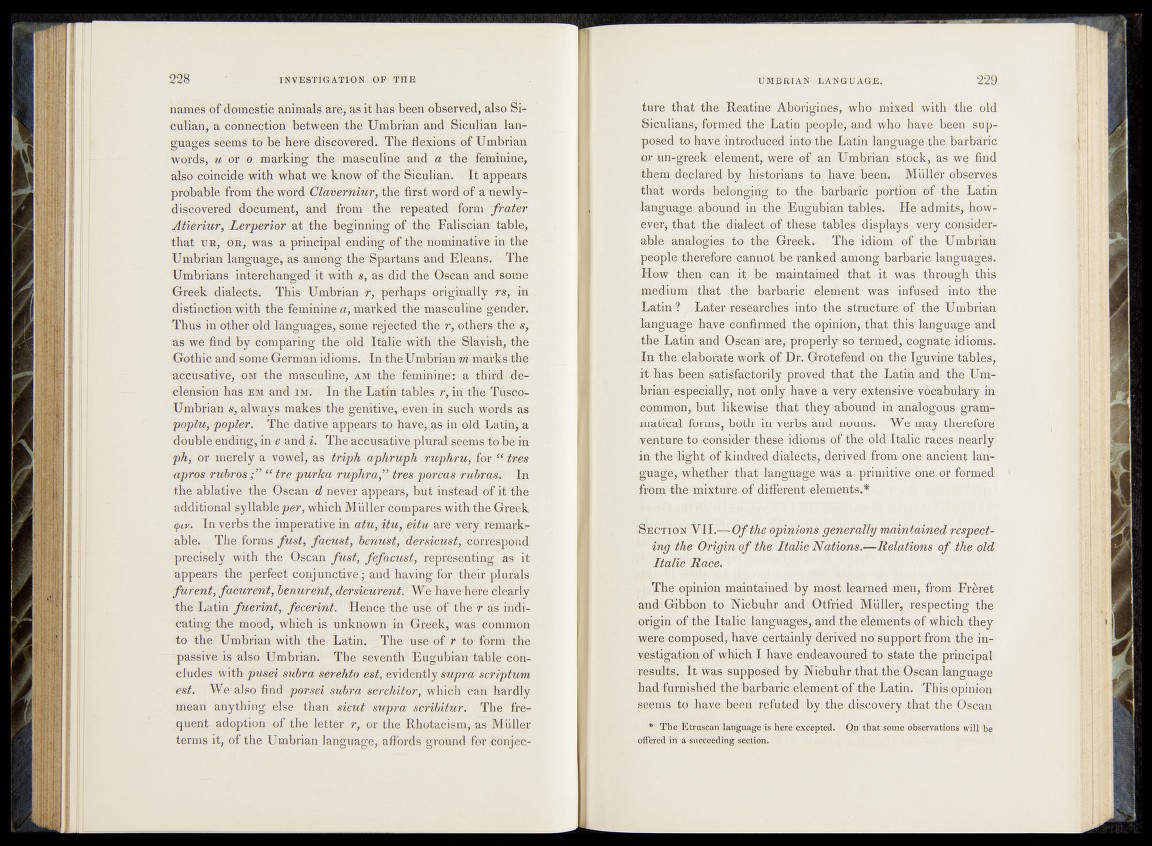
names of domestic animals arëy.as it has been ^served, also Sicilian,
a connection between the Umbrian and Siculian languages
seems to be here discovered. The flexions of Umbrian
words, u or o marking themasculinC and a the feminine-,
also coincide with what we know of the Siculian. It appears
probable from the word Claverniur, the first word of a tièw'lÿ-
diseovered document, and from the repeated form frater
Atieriur, Lerperior at the beginning of the Faliscian table,
that üb, or, was a principal ending of the nominative in the
Umbrian language, as among the Spartans and Eleans. The
Umbrians interchanged it with s, as did the Oscan and some
Greek dialects. This Umbrian r, perhaps originally rs, in
distinction with the feminine a, marked the masculine, gendek
Thus in other old languages, Some rejected the r, others the s,
as we find by comparing the" old Italic with the Slavish,^tbe
Gothic and some German idioms. In the Unibrian rn marks the
accusative, om the masculine, am thefemirime: a thirdddèi-
clension has em and im. In the Latin tables m iiP&h©: Tnsco-
Umbrian s, always makes the genitive, eveft-iri such words as
poplu, popler. The dative appears to have, as. in old Latin; a
double ending, in e and i. The accusative plural seeSdsto be in
ph, or merely a vowel, as triph aphruph ruphru, ïàr^trës
apros rubros “ tre purka ruphra,” très porcas rubtas. In
the ablative the Oscan d never appears; but instead of it the
additional'syllable per, which M idler compares with the Greek
<l>iv. In verbs the imperative in atu, itu, eitu.are vety remark-
able. The formsfust,facust, benust, dersicust, .correspond
precisely with the Oscan fust, fefa.cust, representing as it
appears the perfect conjunctive ; and having for their plurals
furent, facurent, benurent, dersicurent. We have here clearly
the Latin fuerint, fecerint. Hence the usé of the r äs iindicating
the mood, which is unknown in Greek, was common
to the Umbrian with the Latin. The use of r to form the
passive is also Umbrian. The seventh E ugubian tab le bbn-
ciudes with pusei subra serehto est, evidently supra scriptum
est. We also find porsei subra scfehitor, which can hardly
mean anything: else th a n I sicut. supra scribitur. The frequent
adoption of the letter r, or the Rhotacism, as Midler
terms it, of the Umbrian language, affords ground for conjec.-
ttoTe that the**Reatine .Aborigines, who mixed with the old
Siculians,1 fofr&edl thp-fLatin people, and who have been supposed
td kayerintroduced into the-L&tin language the barbaric
or un-greek\ element, -were-of,- an .Umbrian stock, as we find
them declarediby MstpliaSPs to,;ha-vp been. Muller observe^
that w o r d s b a r b a r i c p o rtjpnof the Latin
language-Uboupd i©#n§ Eu||nbian tabMjjfe He admits, however^
that the dialect-of these tables displays,, very^44Ps^ er"
able - analog&«es - ddh th e - Greek. The idiom of th e 1Umbrian
peopledtierCfore cannot boranked among barbaric languages.
'How then can it'ib^-s maintained that was through; this
.medium {.that the barbatie nelepient was infused into the
.Latin-?' Later, resparchegtifjtq ,the &tr-ucture/qfr$W- Umbrian
language have -‘confirmed the jdpinipn^ that* tMs ladgUiagef and
th e . Latinundi’Oscan are,*prpperly? so termed,:eognatf}idioms.
In the elaborate^ork of Dr. Grotefend on the Iguvine tablet,'
Jtihas been satisfactorily proved!that the Latin andU|ie; .Umbrian
e s p e c ia lly ,-o n ly have a very extensive vocabulary in
commohrfesi^ likewise that they -abound* in ai^dl'^^c® grammatical
forms, both in. verbs and nou-ifs-‘ W e may therefore
ventured® consider these idioms of the, old Italic races nearly
in the light of kindred dialects,-derived from one ancient lan-
jgsuage,- whether.-that language was a primitive, one pr ,formed'
from the* mixture of different elements.*
Section V ll^ 'O fth e opinions generally maintained respecting
the Origin of the Italic Nations.—Relations of the old
■ Italic Race.
The opinion maintained by most, learned men, from Fr&ret
and Gibbon to Niebuhr and Otfried Muller, respecting the
origin of the Italic languages, and the elements of which they
were composed, have certainly derived no support from the investigation
of which I have endeavoured, to state the principal
results. It was supposed by Uicbuhr that the Oscan language
had furnished the barbaric element of the Latin. Thisopinion
seems to have been refuted, by^the discoy.ery that the Oscan'
* The Etruscan language is here excepted. Op that some observations will be
offered in a succeeding section.